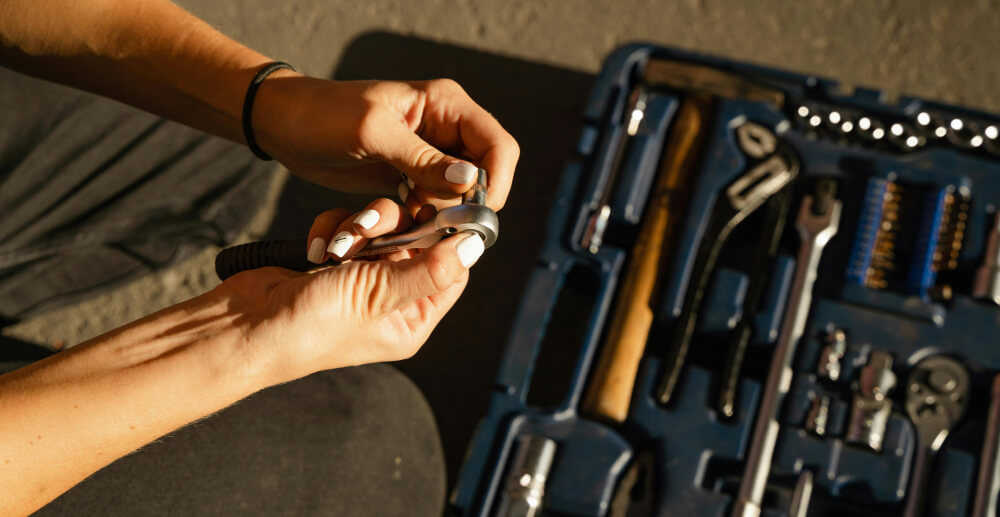You can get help for an eating disorder.
Let me tell you a story about the early days of my eating disorder. I was 22 years old and living in Louisville, Kentucky. I had just graduated from college, and it was my first year trying to make a go of it as a semi-adult. A horrible break up the year before had left me totally shattered. Everywhere I went, my little heart trailed behind me in little broken pieces. I was a sad young lady.
The wrong doctor can be dangerous.
In an effort to do something, anything, to get out of my funk, I started therapy with Linda. She was kind-faced and had a big cozy therapy chair and pictures of birds and trees around her office. I picked her name out of the yellow pages (um, yes, this was awhile ago, we didn’t really use the internet yet), and we got down to the business of trying to lift me out of my depression. Me being me, and with my history, I came to the awesome idea for the one millionth time that if I were thinner I would be happier. I brought this idea to my therapist, who signed off on it as an AMAZING solution to my current malaise.
“Me being me, and with my history, I came to the awesome idea for the one millionth time that if I were thinner I would be happier. I brought this idea to my therapist, who signed off on it as an AMAZING solution to my current malaise.”
Linda hooked me up with a ‘doctor’ who was prescribing Fen Phen, a type of speed. It later became illegal because it punched little holes in your heart. I got what I wanted; I was able to stop eating for six months and became totally skinny. It seemed great UNTIL the speed-type drug almost killed me. I spent the next twelve years binging, purging, starving, and drinking until I decided to start my recovery journey. I’ve been in recovery for ten years now and it’s awesome, YAY!!! But I digress.
I want to talk about mental health professionals. Specifically, how many of them don’t know what the fuck they are doing when presented with somebody who has addiction issues or an eating disorder. Or, most likely, some intertwined combination of those two. I have more examples beyond the lovely Linda. Doctors who told me to ‘just stop’ because ‘didn’t I know it was unhealthy?’ Uh … yeah! I never thought that smoking and drinking all day and puking until I bled was the epitome of health.
One psychiatrist I went to who tried to use a harm reduction model on me for like two years. Like sure, I can try to go from 50 to 45 drinks a week, but honey, this ain’t workin’. (I have nothing against harm reduction! It just wasn’t right for me.) Another doctor, who told me not to gain any weight and I would be fine AFTER I told her that I had an eating disorder involving binge/purge/starve. Yikes.
The stories go on and on. The point is that I went to these yahoos with diplomas because I wanted HELP. And when I asked for HELP, they seemed to do everything a person could do to ensure the worst possible outcome. The worst outcome didn’t happen, because I’m still alive. But I was let down so many times by the medical professionals, therapists, and nutritionists that I’ve compiled a list of questions and considerations when trying to find a team of providers to help guide on the recovery journey.
Currently I am in PROVIDER HEAVEN with a therapist, eating disorder nutritionist, and psychiatrist who specializes in the crossover between mental health and addiction. Which means, practically speaking, that when I feel anxious she’s not going to toss a benzo my way. So here’s my list. I hope it helps you clear through the weeds and the muck and the slime to get to the gems that are out there!
Questions to ask and things to consider:
This is very biased list, based entirely on my own experience. It’s not true for everybody all the time. It’s just what’s worked for me.
- Does this therapist/psychiatrist/nutritionist have SPECIFIC training working with addiction and eating disorders? ED recovery is COMPLEX and SPECIFIC. You wouldn’t go to a dentist for open-heart surgery. So you shouldn’t go to a well-meaning clinician who has mostly worked with the general population. For the most part, they DON’T KNOW WHAT THEY’RE DOING unless they are trained.
- Does the nutritionist have experience (you’ll notice a trend here) working with Eating Disorder clients? ED Clients DO NOT NEED information about nutrition or diets or fiber or whatever. We need help with our mental relationship to food and body, and how that can interfere with us making choices about what and how we eat.
- If any provider starts by talking about a healthy meal plan that sounds suspiciously like a diet (but couched in the language of health), run for the hills. Fish oils, chia seeds, and pomegranate are awesome—and they can totally be part of a meal plan as much as hot dogs and pizza—but they are NOT saviors. And they’re not the cornerstone of recovery from a complicated mental illness. There’s totally room in recovery for a healthy meal plan, BUT many ignorant providers start with a meal plan as if it is THE solution. It’s not THE solution. It’s part of a complex system of solutions that are first and foremost about feelings and learning how to live.
- Going to your primary care doctor can be very upsetting to people with a history of ED because of being weighed. You can ALWAYS ask to have a blind weigh-in where they don’t tell you the number. And please note: If you are going to the same doctor you’ve always seen, you can decline to be weighed. We in ED recovery have a hard time of letting go of our attachment to certain numbers. It always works best to make the numbers none of our business.
“We in ED recovery have a hard time of letting go of our attachment to certain numbers. It always works best to make the numbers none of our business.”
- I always ask doctors not to talk to me about my weight or mention it in any form unless there is a serious reason why they must. Like, they think I’m having an issue with my thyroid or a reaction to a medication. We can talk about health all day long without talking about weight. I literally say to them, “Please don’t talk to me about my weight unless there is an overwhelming and pressing concern directly related to my weight. I have a history of an eating disorder, and talking about my weight in terms of numbers really trips me up and does me more harm than good.”
Recap and summary:
It is your right to work with people who are trained and knowledgeable about how to work with you. It’s never safe to assume that people are experts in the field—even if they say they can handle the problem. I want to know their training and their history as a clinician working specifically with this population. Referrals from reputable sources are MAGICAL. Once you find one amazing provider, getting referrals from them is your best bet. If you are in a part of the country where it feels like these people don’t exist, it might be because they don’t exist there. Luckily, online help like Workit Eating is here. It’s better to Skype with an expert than to get ongoing care from somebody who is helping you to dig your hole to hell.
“It’s never safe to assume that people are experts in the field—even if they say they can handle the problem. ”
And remember:
Even after all my cautionary tales, there’s no such thing as a perfect provider. And even wonderful clinicians are going to do and say things that you don’t like. Sometimes it’s time to run for the hills, and sometimes it’s time to stay.
When in doubt:
Build relationships with people in recovery who have rich and beautiful lives. Then when you’re faced with these choices, you never have to choose alone.




